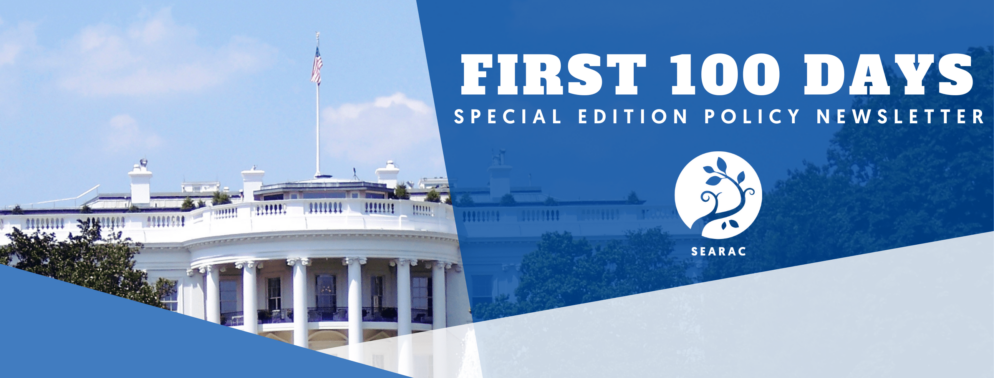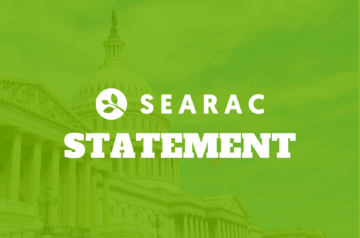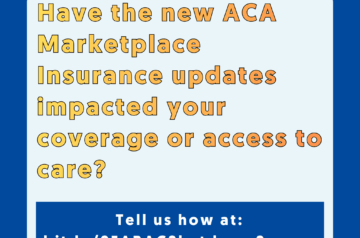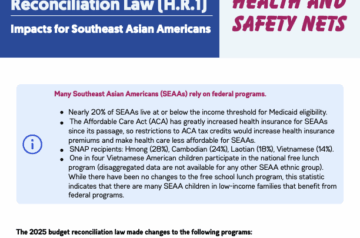TRUMP’S EXECUTIVE ORDERS
The new administration issued a wide range of executive orders (EOs) – which are written orders by the president that do not require approval by Congress – that attack immigrants and refugees, massively delay resettlement and reunification, encourage discrimination, and create a culture of fear. SEARAC opposes these EOs, among others, and will continue to fight against harm to our communities. (Reader’s note: SEARAC will not be repeating the dehumanizing language included in the White House’s official names for these executive orders.)
Read our analysis of key EOs we are monitoring below:
EOs calling for the massive expansion of detention and deportation of immigrants
What do these EOs do:
Expand the criminal legal system’s authority to detain and deport immigrants and refugees.
What does this mean: The White House has directed local law enforcement agencies to carry out immigration arrests, detention, and deportation, which are a federal responsibility. The White House also issued a general call for making criminal charges against immigrants who violate immigration law.
Who will this primarily impact: Communities of color, including Southeast Asian American (SEAA) communities, due to longstanding racial profiling by US law enforcement and legal systems.
Instruct immigration authorities to expand immigration detention and to keep people detained during their deportation proceedings.
What does this mean: The Biden Administration’s enforcement priorities and any related policies are also canceled.
Who will this primarily impact: Communities of color, including SEAA communities, will be targeted for detention and deportation.
Call for the Department of Homeland Security to prevent travel to the United States from countries that do not accept deportations.
What does this mean: Countries may be pressured into accepting individuals with removal orders from the United States, including refugees from Southeast Asia who have already served their time and become reintegrated into their communities.
Who will this primarily impact: The first Trump Administration banned certain visas from Cambodia and all immigration from Laos. SEARAC expects the new Trump Administration to do this again and separate many SEAA families.
Indefinitely pause the Refugee Admissions Program.
What does this mean: Tens of thousands of people who had already been vetted and approved to be resettled in the United States are stranded in limbo. Some had recently arrived to the country and now have uncertain legal status; others remain unable to flee from unstable or dangerous conditions in their home countries.
Why does this matter: SEAAs know firsthand the life-saving importance of accepting refugees to the United States. In the aftermath of war, violence, and persecution in Cambodia, Laos, and Vietnam, the United States welcomed SEA refugees who risked their lives to seek safety for their families. Our community’s experience was key to the creation of refugee resettlement and asylum programs, which hold bipartisan support. But instead of upholding the values of freedom and safe haven, the new administration is turning vulnerable people away.
Attempt to end birthright citizenship.
What does this mean: The 14th Amendment guarantees US citizenship to anyone born in the United States, even if their parents are not citizens. The only legal way to get rid of birthright citizenship is by changing the US Constitution; in fact, the EO has already been blocked by a federal judge for being unconstitutional.
Who will this primarily impact: Children whose mothers are undocumented or in the United States with temporary permission for work, travel, or education and whose fathers are not US citizens or lawful permanent residents.
EOs attempting to end diversity, equity, inclusion, and accessibility initiatives in the government and private sector
What do these EOs do:
Reverse longstanding efforts to create diverse and inclusive workplaces, specifically by
- Canceling previous executive actions that improved diversity in the federal government workforce.
- Eliminating all federal government offices, positions, plans, and initiatives related to diversity, equity, and inclusion; and
- Using the Department of Justice (DOJ) to pressure private companies to end their diversity, equity, and inclusion efforts for workers.
Why does this matter: People who feel valued and respected in their workplaces are more engaged and more likely to contribute their best. Rolling back these efforts will prevent many people from feeling like they belong in their workplaces and meeting their full potential, whether they’re a public servant or work in the private sector.
Create chaos in federal financial assistance programs, including essential services, economic support, and safety net programs.
What does this mean: The EOs include specific directions to pause foreign assistance; terminate all diversity, equity, and inclusion programs; and pause some climate programs. However, the Trump Administration’s implementation of the EOs has resulted in widespread confusion and paralyzed many more important federal programs and grants.
Here’s what happened:On Jan. 27, the White House Office of Management and Budget (OMB) issued a memo pausing all federal programs until they could be reviewed for compliance with the EOs, to be effective the next day.
On Jan. 28, this memo was stopped in court.
On Jan. 29, OMB rescinded the funding pause memo. However, the EOs still apply.
Why does this matter: The Trump Administration’s back-and-forth has created chaos in programs and funding that countless individuals, families, community organizations, and small businesses rely on. For example, Medicaid’s web portal went dark in every state, even though Medicaid was specifically excluded from the OMB funding pause memo.
Encourage discrimination against transgender, nonbinary, and intersex people.
What does this mean: Although the EOs attempt to force the federal government to discriminate against transgender, nonbinary, and intersex people, they are still protected under law. EOs cannot create or change people’s legal rights or protections, so all existing laws that make it illegal to discriminate against transgender, intersex, or nonbinary people still apply. This includes sex discrimination laws like Title IX (education), Title VII (employment), and Section 1557 of the Affordable Care Act (healthcare).
Who will this primarily impact: More than 11.3 million lesbian, gay, bisexual, and transgender adults live in the United States; 40% identify as a person of color, with 3% identifying as Asian American or Pacific Islander.
Instruct the Department of Education and DOJ to issue guidance to state and local education agencies, colleges, and universities on following the Supreme Court’s decision in SFFA v. Harvard.
What does this mean: While the Supreme Court struck down two colleges’ race-conscious admissions policies in its 2023 decision, colleges and universities can still consider how students’ experiences with race have contributed to their character and potential. The Trump Administration will likely try to narrow this even more and prevent any aspect of race or ethnicity in admissions.
Why does this matter: When colleges and universities include race and ethnicity as part of the admissions process, they can better see students’ full potential and how their life experiences have shaped them. The Supreme Court ruling has since resulted in decreases in enrollment for students of color.
Eliminate the White House Initiative on Asian Americans, Native Hawaiians, and Pacific Islanders (WHIAANHPI) that was formed under the previous Biden Administration.
Why does this matter: WHIAANHPI was an important government unit that advocated for Asian Americans, Native Hawaiians, and Pacific Islanders (AA & NHPI). It worked across federal agencies and with the White House to eliminate barriers to equity and opportunity for AA & NHPI communities.
CONGRESS’ ANTI-IMMIGRANT BILLS
Since the 119th Congress began its session on Jan. 3, it has already advanced bills that will harm immigrant and refugee communities. The Laken Riley Act, which Trump signed into law on Jan. 29, requires the detention and deportation of immigrants without legal status who are simply arrested or charged — even if they are never convicted. The bill also gives state officials unprecedented power to interfere in immigration cases and parts of federal immigration law. This bill will separate families and destabilize communities. In response to the bill, Quyên Đinh, SEARAC Executive Director, stated:
“The passage of the Laken Riley Act is a direct attack on immigrant and refugee communities, including thousands of undocumented Southeast Asian Americans who have built their lives in this country. By mandating detention and deportation without due process, this law creates a dangerous precedent of how we treat immigrants and will tear apart families that have already endured so much. This bill is not about safety — it is about criminalizing immigrants and giving state officials unchecked power over federal immigration enforcement. We strongly condemn this harmful legislation and urge policymakers to protect, not punish, the communities that have contributed so much to this country.”
H.R.30, which passed the House on Jan. 15 and will be up for a Senate vote, also expands the criteria for which an individual can be deported, under the guise of preventing domestic violence. However, this bill fails to actually protect immigrant survivors of gender-based violence, who often face language and cultural barriers, unfamiliarity with legal systems, and limited access to legal resources. This bill risks harming immigrant survivors, including SEA refugees, by threatening them with deportation instead of ensuring them legal protections against the immigration consequences that often come out of interacting with the legal system.
The Laken Riley Act and H.R.30 criminalize and dehumanize immigrant communities. Read more about the Laken Riley Act here, and about H.R.30 here.
READ MORE
- Analysis of Trump Day 1 Executive Orders Unconstitutional, Illegal, and Cruel (National Immigration Law Center)
- Community Explainer: Laken Riley Act (National Immigration Project)
- Trump’s Day 1 Executive Orders: Focus on Criminalization and Detention (Immigrant Justice Network)
- Know Your Rights Materials (Immigrant Legal Resource Center)
- Know Your Rights: Guide for Immigrant Communities in 2025 (Asian Law Caucus)
- Know Your Rights with ICE (Immigrant Defense Project)
- Setting the Record Straight on Sanctuary Policies (National Immigration Project)
- Press Release on New DHS Directives (Detention Watch Network)
- Immigration Consequences of Convictions Checklist (Immigrant Defense Project)




